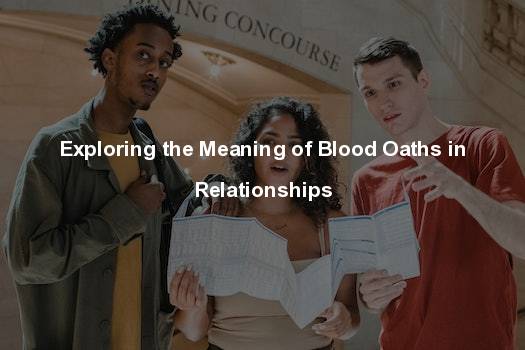In the realm of relationships, couples often employ various symbols and rituals to signify their deep connection and commitment to each other. Among these, the blood oath stands out as a historical and culturally significant gesture, symbolizing unwavering loyalty and devotion. This article delves into the significance of blood oaths in relationships, tracing their origins, exploring their symbolism, and examining modern interpretations.
Understanding Blood Oaths
A blood oath within a relationship represents a sacred and unbreakable bond between two individuals, transcending mere words or promises. It entails a symbolic act of sharing blood, symbolizing the depth of commitment and connection. Historically, diverse societies utilized blood oaths to cement alliances, bind individuals in lifelong agreements, or mark pivotal transitions.
Historical and Cultural Significance of Blood Oaths
Blood oaths hold profound importance across various historical periods and cultures, serving as enduring symbols of loyalty, trust, and commitment. Let’s delve into their significance:
Ancient Civilizations:
Mesopotamia: The ancient Mesopotamians viewed blood oaths as sacred bonds, solidifying promises between individuals or groups.
Ancient Greece: Greek mythology depicts gods swearing blood oaths, illustrating their influence and domains.
Roman Empire: Roman soldiers took oaths of loyalty, pledging allegiance to the emperor and state through symbolic acts.
Warrior Cultures:
Vikings: Norse blood oaths, like “blóðbræðralag” or “blóðfesta,” forged brotherhood and loyalty through shared blood.
Samurai Tradition: Feudal Japan saw samurai warriors making blood oaths (“eki”) with comrades, cementing loyalty to lord and comrades.
Native American Tribes:
Iroquois Confederacy: Blood brotherhood ceremonies united individuals through shared blood, fostering lifelong bonds.
Sioux Tribe: The Sioux practiced “Hunka,” exchanging blood to signify kinship and enduring commitment.
These examples illustrate how blood oaths were integral to diverse cultures, symbolizing trust, loyalty, and unity.
Symbolism and Meaning of Blood Oaths
Blood oaths convey profound symbolism, representing a deep and sacred connection between individuals. Sharing blood symbolizes:
Profound Connection and Unity: Merging individual lives into a unified whole.
Unwavering Loyalty and Trust: Demonstrating steadfast commitment and support.
Sacred and Binding Promise: Signifying solemn agreements beyond ordinary commitments.
Eternal and Unbreakable Bond: Representing enduring connection and solidarity.
Symbolic Life Force: Reflecting vitality and essence, intertwining lives and destinies.
While the literal practice of blood oaths may be rare today, their symbolism resonates, reminding us of the importance of commitment, trust, and loyalty in relationships.
Modern Interpretations of Blood Oaths
While literal blood oaths may be less common, modern couples express commitment through alternative means:
Exchanging Vows: During weddings, partners declare personalized vows, reflecting their dedication and love.
Creating Personal Rituals: Couples develop unique traditions symbolizing unity and shared values.
Wearing Symbolic Jewelry: Rings and other jewelry serve as tangible reminders of commitment and connection.
Collaborative Projects: Engaging in shared endeavors strengthens bonds and creates lasting memories.
Written Declarations: Expressing feelings and promises through letters or declarations reinforces commitment.
These modern interpretations honor the essence of blood oaths while respecting personal boundaries and safety.
Psychological Perspective: Symbolic Rituals
Symbolic rituals, including blood oaths, impact relationships psychologically:
Creating Meaning and Shared Narrative: Rituals foster a sense of belonging and reinforce shared experiences.
Reinforcing Emotional Connection: Rituals deepen emotional bonds, enhancing intimacy and understanding.
Building Trust and Security: Rituals provide stability and predictability, fostering trust and safety.
Enhancing Communication: Rituals offer nonverbal avenues for expressing commitment and values.
Serving as Transitional Objects: Rituals navigate life transitions, offering continuity and meaning.
Cultural and Personal Significance
Symbolic rituals connect individuals to their cultural heritage and personal beliefs, providing authenticity and meaning within relationships.
Biblical Perspective
Though not explicit, biblical principles emphasize commitment, honesty, integrity, and mutual consent in relationships.
Conclusion
Blood oaths, steeped in history and symbolism, signify profound commitment and connection. While their literal practice may be rare, their essence endures through modern interpretations. Partners navigate relationships with love, respect, and a commitment to mutual growth, honoring the sacred bonds they share.

